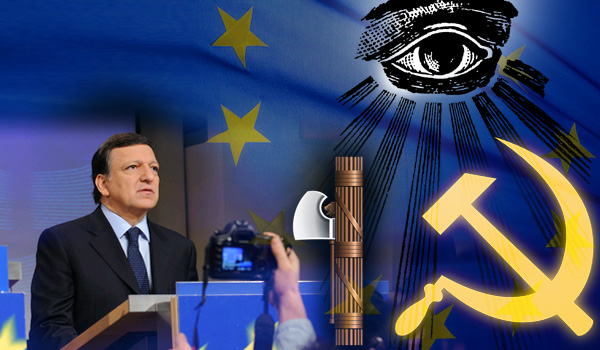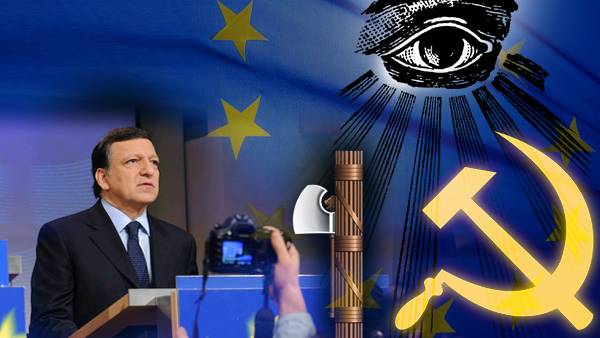EU votes in new commission after long delay
Source: euobserver.com

The European Parliament has given the green light to the new European Commission, ending an eight month hiatus in the governance of the union at the height of the economic crisis.
European Commission president Jose Manuel Barroso and his 26-member college received 488 votes in favour, 137 against while 72 MEPs abstained.
The centre-right European People's Party (EPP), the largest group in the parliament, and the Liberal group pledged their support for Mr Barroso and his team ahead of the ballot. The Socialists, after some internal debate, also said they would vote in favour.
José Manuel Barroso a Maoist Student Leader
Vladimir Bukovsky - The European Union - the New Soviet Union? (Video)
Barroso: European Union is 'empire'
The Greens and the far left voted against while the anti-federalist ECR - citing democracy grounds - abstained.
Prior to the vote, the centre-right Portuguese politician said his team "has new ideas and experiences" and reflects a "broad range of views."
He called on European politicians to move away from the "intellectual glamour" of pessimism and instead made a plea for "boldness."
The commission's main goals of the next five years will be: to help EU countries to put the economic crisis behind them, to take the global lead on climate change and to make Europe more energy efficient, said Mr Barroso.
Referring to the dire straits of the European Union's economy, the commission president said economic co-ordination should be reinforced adding: "We should have a real economic union."
He promised that Olli Rehn, the commissioner in charge of economic and monetary affairs, would use the powers in the new Lisbon Treaty - allowing the commission to issue warnings and policy recommendations to member states falling back on economic targets - to "develop this line."
In the lengthy debate ahead of the vote, Mr Barroso came under fire from several euro-deputies. Martin Schulz, the leader of the socialists, accused the commission chief of being too presidential in style and suggested the commission was "market-obsessed," while ignoring social issues.
Green leader Daniel Cohn Bendit called his fellow deputies from the larger political groups "hypocrites" for feeling lukewarm about Mr Barroso and his team but casting a favourable vote anyway.
Gesticulating animatedly, the French MEP said most of the new team did not show any "determination" or "vision" and concluded that Europe is "not up to" dealing with the economic, financial and ecological problems it faces.
While the new college - with 14 returning faces - failed to produce great enthusiasm among MEPs across the political spectrum, deputies by and large declined to single out individual commissioners for criticism.
The main exception was the EU's foreign policy chief Catherine Ashton. The Briton, in the job since 1 December, attracted opprobrium from several MEPs for not coming forward with new ideas and for, so far, failing to put her stamp on the new post.
EPP chief Joseph Daul said: "From Haiti to Iran, from Afghanistan to Yemen, from Cuba to transatlantic relations, the European voice has not, to date, met our expectations." "We expect more from a High Representative than we have seen until now," said Liberal leader Guy Verhofstadt.
The parliament's vote frees the commission to start work on Wednesday one day ahead of an extraordinary meeting of EU leaders to discuss the economic crisis.
The commission's leadership has been a topic, to a greater and lesser extent, in Brussels since the June European elections.
A delay in re-electing Mr Barroso as president and then delays in the coming into force of the new Lisbon Treaty meant the commission has been in caretaker status since November and has been distracted since last summer.
EP gets foothold law-making
MEPs on Tuesday also voted strongly in favour of a set of principles governing future relations between the commission and the European Parliament.
The resolution, the content of which is to be enshrined in a formal agreement later this year, strengthens parliament legislative initiative rights, enhances its role international agreements and opens the door to it forcing the resignation of individual commissioners.
Source: euobserver.com






















